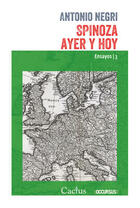is no coincidence that Antonio Negri concludes his trilogy of essays with Spinoza. Because all philosophy and all politics will always have to deal with Spinoza, yesterday and today, to think about the bifurcation, that of yesterday in the creation of the modern State and capitalism, at that key moment that was the seventeenth century, formation of a world that today we see crumbling, but without losing its power of dragging, destruction and reinvention.
As Diego Sztulwark says in his prologue, Spinoza as "ontological site of rebellions". And Negri will again inscribe the lineages of a subversive Spinoza, with the Neapolitan revolutionary Masaniello, with Machiavelli and with Marx, and more here, with the thinkers of the French 68, the so-called by Negri "joyful Spinozists", who extended us a bridge back and forth to him, from Matheron and Althusser to Deleuze.
With the l...read more
Shopping cart
Loading cart
Important notices
|
|
Recordando a André Rouillé: Su legado en la fotografía André Rouillé 1948 - 2025 |
|
|
Libros de filosofía y co. Disponibles en Librería Herder |
|
|
Revista Filosofía & Co. nº 9 Nueva revista de filosofia divulgativa y actualidad |
|
|
"Espacios de la filosofía" - Mauricio Beuchot - Novedad Herder México |
|
|
Revista Filosofía & Co. nº 8 Nueva revista de filosofia divulgativa y actualidad |
Pay safely with:


In the webshop
New
|
|
Medios calientes 70159 $400.00 -0.00% $400.00 |
|
|
Amigdalatrópolis 70157 $390.00 -0.00% $390.00 |
|
|
La instauración filosófica 70142 $570.00 -20.00% $456.00 |
|
|
Adiós al capitalismo 70116 $580.00 -0.00% $580.00 |
|
|
Su Majestad 70410 $319.00 -15.00% $271.15 |
In the press
Promotions
|
|
Panorama A1.1, Deutsch als Fremdsprache Übungsbuch 36726 $235.00 -35.00% $152.75 |
|
|
El tratamiento de los niños autistas 70240 $675.00 -25.00% $506.25 |
|
|
Historia del arte I 70244 $1,545.00 -25.00% $1,158.75 |
|
|
Diccionario de términos filológicos 70241 $900.00 -25.00% $675.00 |
|
|
Verbos conjugados $600.00 -25.00% $450.00 |





